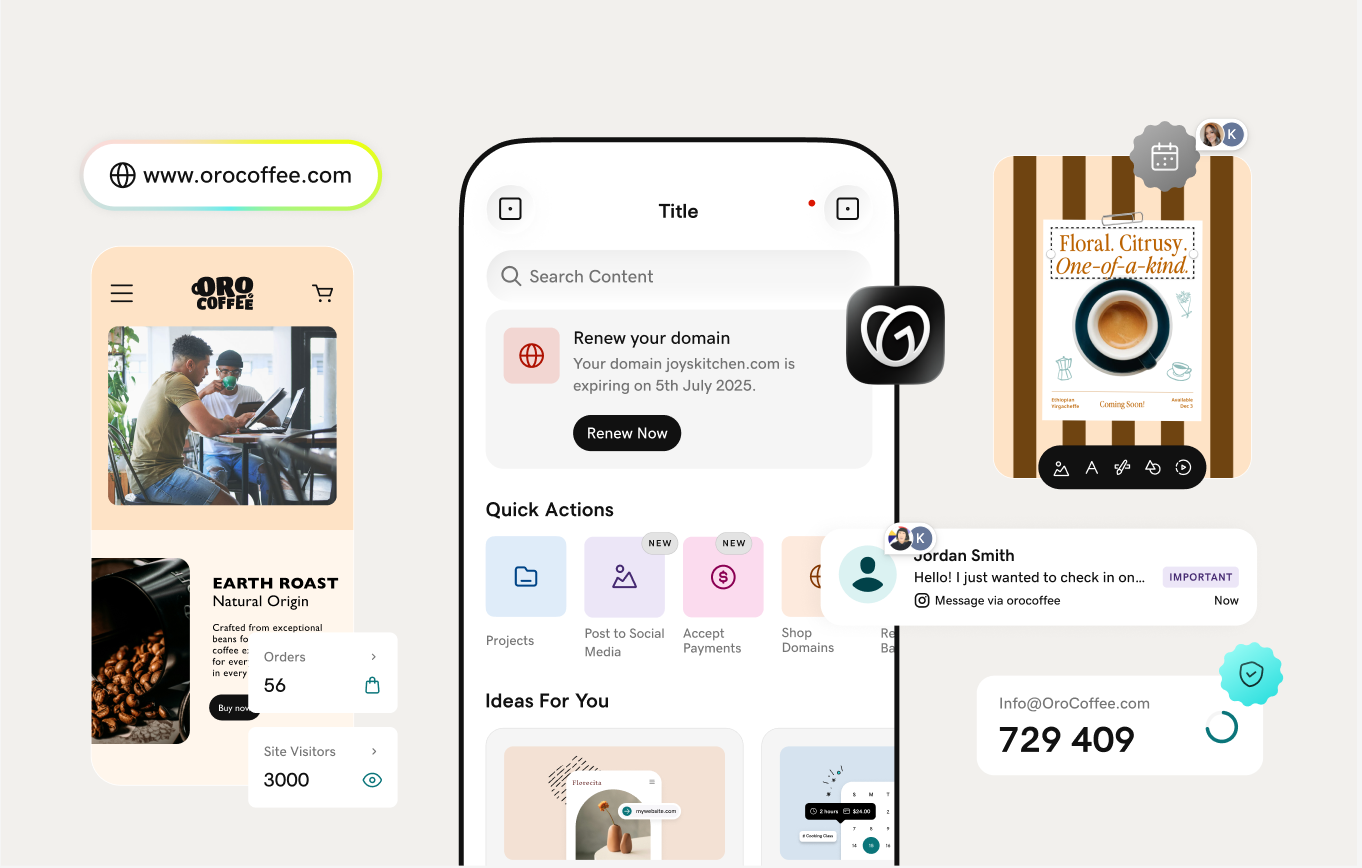Setting up your own online business starts with hunger. Maybe you’re hungry to stop working for ‘The Man’. Maybe you’re hungry to make your hobby your job. It could be you’re hungry to take control of your career.
Whatever craving brought you here, the reason you’re reading this now, is you’re thinking of satisfying your appetite by starting your own business.
Fill-up on this 7-step recipe guide to starting your own online business.
What’s so sweet about being online?
Some people maintain that an ‘online’ business is one that sells over the internet. Clearly that’s true but, here at GoDaddy, we think that an online presence needs to be an integral part of any business. Online is where you establish your brand and spread the good word. Sure, it may be tricky to cut someone’s hair over the internet, but your business still needs to be present online – otherwise good customers won’t know to bring their hair to you.
For those businesses that can sell online, it’s crucial. Your shop window is no-longer limited to a single geographical location – your products can be seen by anyone in the world. Day or night.
Are you hungry to start an online business?
Set up your online business correctly and it can be earning you money while you sleep. Sales through online stores are expected to increase by more than 11% each year in the Middle East region and it’s showing no sign of slowing down.

Getting your bricks and mortar business online, in one form or another, is a great driver of sales.
So, what’s the recipe for online business success? Well, let’s start by assembling the ingredients of any successful business startup.
The ingredients of an online business
So, you know what you want to do. And, whether that’s to become a landscape photographer or a hairdresser, to run a coffee shop, or make bespoke jewelry, there are certain key ingredients that need to be in the mix, before you start.
What follows is a guide only – not rules written in stone – there are many other guides, right here on GoDaddy, that will offer you valid and valuable information on creating an Online Business. We’ll link to a lot of them, for you.
But your business is yours. It’s different from everyone else’s, and there’s no one way to run a business. So, pick and choose the bits of advice that suit your needs.
-
Ingredient #1: Name your business
If you’re going to be your own boss, and work by yourself, you will be ‘Self Employed’, otherwise known as a ‘Sole Trader’. It’s perfectly sensible, therefore, to trade under your own name – but will that tell potential customers what you do?
You need a name which shares your vision and inspires interest in your business. It will also help if it grabs the attention of a casual passing customer.
It may feel odd, at first, giving yourself a ‘company’ name, when it’s just you working alone in your spare bedroom. But, what about when your business builds and you start taking on staff and move to new premises? Come up with a name that works at scale. Have that extra confidence in yourself. If you sound like a big company, maybe one day you will be!
This is all part of creating a great brand for yourself, which we’ll talk about in much more detail in the next part of this series.
Meanwhile, check out our tips on what to do, and what not to do, when it comes to choosing a name.
One thing to consider – you need to choose a name which also works online.
So, let’s say you’re a hairdresser. People passing your shop can see through the window that you’re a hairdresser. You may even have the old barbers’ pole outside. In which case, calling yourself “Haya’s Place” or “Mohammad’s Place” would be fine. But would “hayasplace.com” tell an online browser, looking for a local hairdresser, that you’re the one for her or him? Probably not.
So, bear in mind that, until you’re famous – you’ll need your business name to help people find and understand you, both in a physical form (if you have a bricks and mortar shop) but also – and arguable more importantly – online.
-
Ingredient #2: Cook-up a red-hot business plan
A business plan is a basic starting point.
It should outline your business goals, your target market and help you identify your unique selling proposition.
This is a chance for you to take what might be a vague desire – a taste for self-employment – and turn it into a strategy that will be the recipe for success.
A business plan helps you work out what your operating costs might be – which will, in turn, help you decide on the prices you need to charge for your goods or services.
It’s a chance to ask those difficult questions that financiers, suppliers, competitors and – most importantly- customers will ask. If you’ve answered those questions for yourself, you should be able to answer them for others.
If you’re not sure where to start, we can offer you some inspiration and a choice of tried and trusted business plan tips.
-
Ingredient #3: Setting out your (market) stall
It’s important to know your target market. These are the people who might want what you’re offering.
How will you know? By doing some market research!
To start with, you’re probably not going to be providing something for a ‘mass market’. A mass audience is often indiscriminate, it doesn’t mind what brand of thing it uses, nor where it buys that thing.
As a startup, you’re more likely to be dealing with a ‘niche market’ (Individuals or small groups who want specific things in a specific way). Niche markets tend to be more discriminating in their choices – they are harder to please but, once they have chosen you, they can be loyal repeat purchasers.
So, ask yourself those hard questions about your niche. There’s some advice about that here.
To get you going, fill-in the blanks about your customers in this list:

- Age and gender: If your typical customers are women in their 20s and 30s, they will probably respond to different products to men in their 40s and 50s.
- Interests: Skateboarders or rock-climbers, for example, may have different motives to knitters or anglers.
- Location: Are your customers in your area, and likely to visit, or are they around the world?
- Personality: This can be tricky to work out, but you’ll just have to figure out whether your customers prefer straight-faced precision or creative, wacky humor.
- Spending power: Simply put, are your customers going to pay AED250 for your product, or AED2.50? You need to price appropriately.
Obviously, people are different from each other, and not everyone in a certain group has the same interests, or the same tastes; but these questions are still a useful method for you to establish the type of people you will be catering to and, therefore, to make sure that your products and services are what those people want.
-
Ingredient #4: Knowing your secret ingredient: USP
A Business Plan is also your chance to nail down your USP – your Unique Selling Proposition. What is going to make people want your product or service, over and above anyone else’s? Unless you’ve invented something revolutionary, there’s a good chance that there will be other people doing what you do. What do you bring to it that makes it unique?
Understanding the competition is a great way of spotting a gap in the market – and filling that gap!
And don’t forget, ‘unique’ doesn’t necessarily mean better – it just means different. A lot of businesses thrive by providing the same service as other businesses – they just market themselves differently. Just look at rent a car companies, their products essentially are the same, what differs in the way they market themselves and position themselves in the market, some may focus on price, some on availability, pick up and dop back locations, variety of cars’ models. However, essentially, they all provide a service where you rent a car from them, pay them for it, and return it back.
Meanwhile – back at your business – the key to your success is to be different – or to use your branding to appear different.
Here are some tips on writing an effective business plan.
What is your USP?
It maybe you – your skills, your history, your connections, your personality. Your USP may be your location, or it may be a process which you offer, unlike anyone else’s.
Whatever you decide it is, you need to be able to focus on that and make sure you concentrate as much of your energy as possible on planning your business around that USP.
Being different is what will get you noticed in the first place. Being great at what you do, is what will get you word-of-mouth support and repeat business.
-
Ingredient #5: Should you register as a sole trader or a limited company?
It’s important to decide the scale and form of your business. Solopreneur, Partnership, Limited company? Only you can decide! Check out our advice on how these businesses structures differ, and what the benefits are of each.
If it’s just going to be you, working alone, that’s the simplest structure, in terms of registration and legislation – but it does mean you are financially liable for the debts of your business.
The same is true – although shared – if you form a Partnership.
Registering yourself as a Limited Liability Company means that won’t be a concern – (it’s right there in the name: ‘limited liability’) – and becoming Limited offers you some legal protections, too.
The Government offers a lot of guidance on this and, since they make and police the regulations, they are the obvious first port of call.
-
Ingredient #6: When the dough comes rolling in…
If you use your personal bank account for your business, the line between personal and business finances gets very blurred. You could end up losing out in earnings, as well as supporting your business out of your savings.
So, consider getting a business bank account. If your business is low risk, with low overheads, you might decide not to bother with this, at least to start with, but it’s certainly something you should consider when moving forward.
-
Ingredient #7: Taking account
The pros and cons of your banking arrangement is one of the things you can talk through with your Accountant.
What, you don’t have one?
Self-Assessment Tax can seem intimidatingly complex – especially if you’re not comfortable filling in forms or doing maths. Tax might be for everyone, but doing your books certainly isn’t. Besides, all that time you spend poring over books is time you’re not doing your business thing and earning your dough.
If you’re unsure – get a qualified accountant to help you with this. You might be surprised at the ways an Accountant can help you legally reduce your liability. They may even pay for themselves in the money they save you!
- Hot Tip: Make sure they’re a qualified accountant – one who has the proper certificates and is a member of regulatory bodies.
-
Ingredient #8: Get advice
Accountants are just one of the professionals you could contact, to make the most of your business as it hots up.
Check out any Business and Enterprise Support in your area. These organizations are usually made up of people who successfully run their own businesses – so they’ve been there and done that.
Consultations and day schools can be very affordable – and invaluable to a startup like yours!
They will also be able to offer you their wisdom on how to go about registering your business, help you sort out any licenses you may need, and advise you on insurance.
They may even be able to point you towards startup finance, advise you on networking, and give you a great understanding of the resources available to you both locally and nationally.
The recipe for success
So, you’ve got all your ingredients in place. It’s time to start mixing them together, yes?
Not quite.
In creating a business, as in baking a brilliant pud, preparedness is the key!
For your business to really start cooking on gas, you need to create a brilliant online strategy. And we’ll deal with that in the next post in this series.






